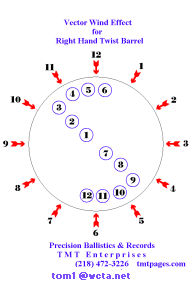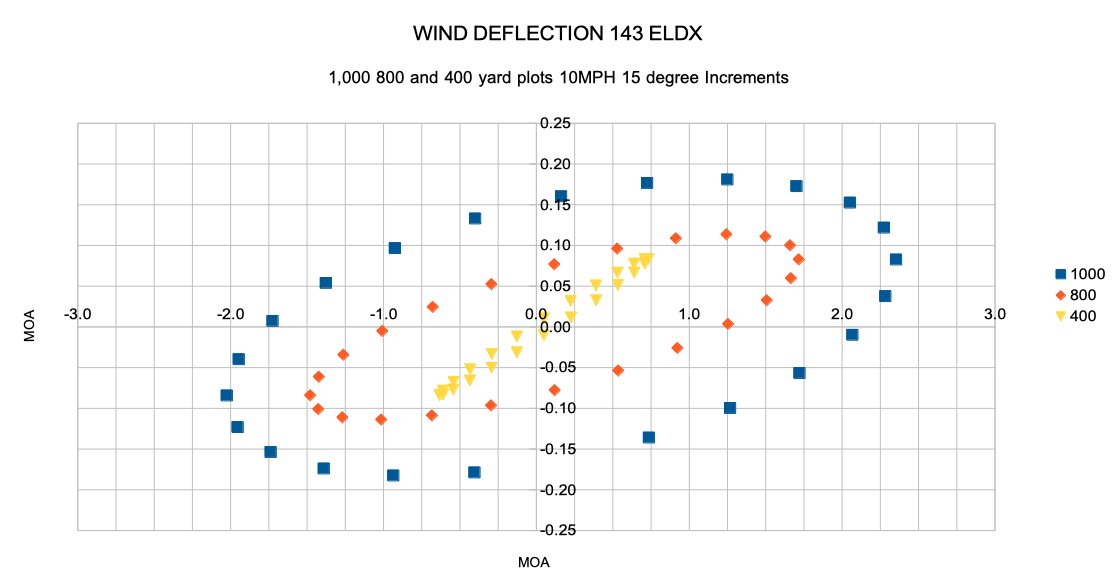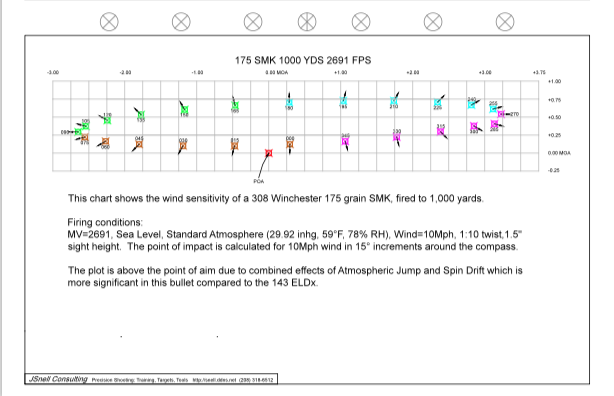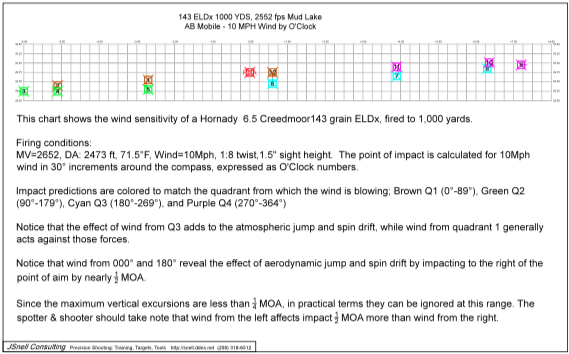Exterior
Ballistics - Wind Effects
Started January
16, 2017.
Updated at random.
Competitive shooters have been using this old wind rose for decades.
I got to wondering how accurate it is for modern high BC long range
bullets.

The Hornady 4 DOF exterior ballistics program accounts for drop,
aerodynamic jump, and wind drift. It also outputs directly to a
file that Office Spreadsheet can read.
In 4DOF I created an accurate profile of my 6.5 Creedmoor firing 143
grain Hornady ELDx bullets and tested the results on targets to 1,000
yards on the range.
Next, using Hornady's 4DOF, I entered 10 mph wind at 15 degree
intervals all the way around the shooter, and stored the results in 100
yard increments to 1,000 yards in the spreadsheet.
I
did a little simple number crunching to combine all of the data into
bullet impact points in minutes of angle horizontally and vertically
away from the point of aim for each range with each wind.
The plot below is simplifed to show only 1,000 800 and 400 yard impact
deflections as predicted by Hornady 4DOF.

Finally, I took that spreadsheet data into AutoCAD and created a true
to scale drawing of the results.
This represents what the wind will do to a bullet very accurately, and
it's qute remarkable in that it looks very little like the old style wind rose.
Another (at the time unremarkable) feature of this plot is the vertical
symetry around the point of aim. Notice wind from 12 O'Clock
supposedly moves the point of impact about -0.17 MOA and wind from 6
O'Clock moves the POI about +0.16 MOA? Jump to the AB Mobile
solutions and you will see that the entire impact plot is shifted
vertically because head wind and tail wind are not symetrical!
I ran some similar plots in JMBALLISTICS and that's where things go
'interesting' ... so I purchased Applied Ballistics Mobile to attempt
to resolve the discrepancies.
DETOUR
As I got more involved in these plots, I found that JMBALLISTICS and
Hornady's 4DOF ballistics programs have a big difference from Advanced
Ballistics Mobile in the amount of wind drift this load experiences at
1,000 yards, particularly with respect to a wind from 9 O'Clock where
it adds to spin-drift.
The data below is for Hornady 143 ELDx, 2652 fps, 2473 ft ASL, 71.5°F,
1-8" twist.
Raw 4DOF output:
Wind 10MPH < 90°, 1000 yds; Total Come Up: +29.10,
Total Wind Drift (MOA): 5.93
Wind 10MPH < 270°, 1000 yds; Total Come Up: +29.68, Total Wind
Drift (MOA): -6.99
Raw JMBallistics output:
Wind 10 MPH <90°, 1000 yds; Drop (MOA): -29.1, Windage
(MOA): 5.2
Wind 10MPH < 270°, 1000 yds; Drop (MOA): -29.1, Windage (MOA); -5.2
Raw Advanced Ballistics Mobile ouptput:
Wind 10MPH < 90°, 1000 yds; Come Up moa*: U29.80,
Windage moa*; R6.15
Wind 10MPH < 270°, 1000 yds; Come Up moa*: U30.50, Windage moa*;
L7.35
The plot below is my latest update replacing the Hornady 4DOF above
with AB Mobile data below. The AB Mobile app allows for selecting
wind by the O'Clock method, and I found it easier to plot using the
O'Clock value, so there are plots every hour (30°) below vs. the 15°
used above.
Here is an article by Bryan Litz about the Hornady 4DOF
but I don't see where the differences he referrs to should be
responsible for the difference I see in this discussion.


To test for altitude sensitivity between my home range (2473 ft AGL)
and Sea Level standard atmosphere I ran the following in AB Mobile:
If the target is at Mud Lake (DA: 2473), in Spring (Temp: 71.5°F) then;
10 MPH < 3 O'Clock = U29.50, R6.00 | 10 MPH < 9 O'Clock = U30.20,
L7.20
If the target environment is changed to sea level std. atmo. (DA: 0ft,
Temp: 59°F), then;
10MPH < 3 O'Clock = U29.40, R5.95 | 10 MPH < 9 O'Clock = U30.10,
L7.15
The difference is negliglible for 1,000 yards.
The new wind plot shows an entirely different set of effects from
Aerodynamic Jump and Spin Drift.
I trust Brian Litz to get ballistics right. With that said, I
went back through my DOPE and found the AB Mobile solutions matched
real world conditions I had recorded over many days, firing locations,
weather and range. So I'm going to rely on AB Mobile solutions
from here on.
Now back to the original discussion.
END DETOUR



